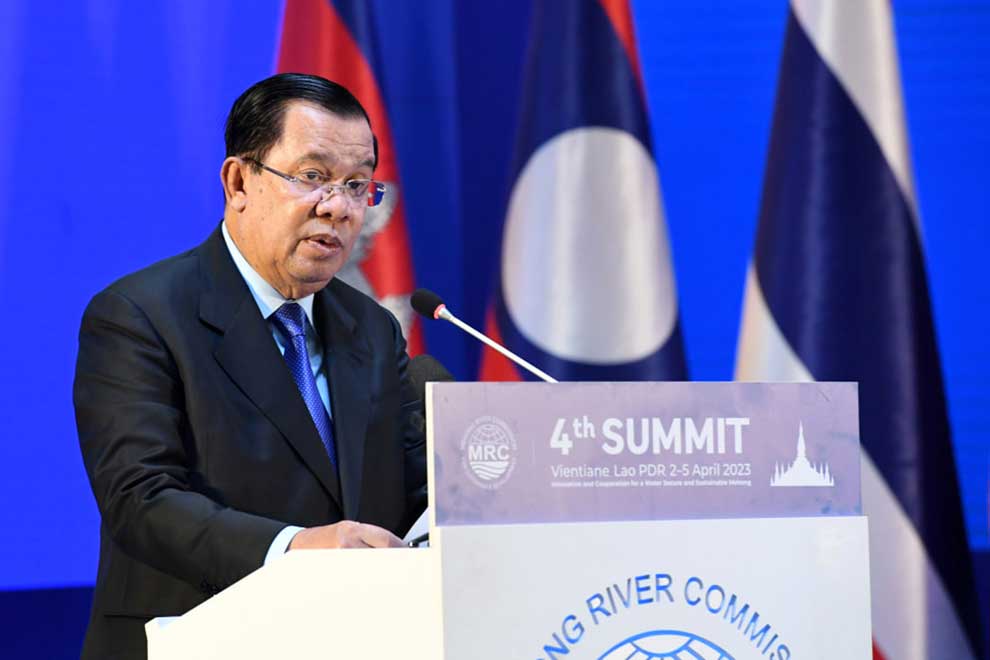
Prime Minister Hun Sen addresses the 4th Mekong River Commission (MRC) Summit in the Lao capital Vientiane on April 5. FN
As the 4th Mekong River Commission (MRC) Summit and International Conference in the Lao capital Vientiane wrapped up on April 5, Prime Minister Hun Sen stressed that enhanced cooperation and collective efforts among the Mekong countries and their partners is essential for the resilient, sustainable and inclusive development of the Mekong River Basin.
He reiterated the Kingdom’s commitment to continued full cooperation to bring about more successes under MRC cooperation framework.
Hun Sen also highlighted an additional issue, requesting development partners to pay close attention to solving the problem of unexploded ordnance (UXOs) in the Mekong River, according to press release from the Ministry of Foreign Affairs and International Cooperation.
The summit, held with the theme of “Innovation and Cooperation for a Water Secure and Sustainable Mekong”, was attended by the heads of government of the Mekong countries and senior representatives of development partners.
Hun Sen agreed that achieving sustainable water, food and energy security is a top priority on the agenda for the Sustainable Development Goals (SDGs) of the Mekong region, as well as for individual countries.
“The sustainability of the Mekong River is at the heart of the focus and concern. Rapid economic development has led to an increase in the use of the Mekong water, and this trend will continue in the future,” he said.
“These factors, combined with the risks and impacts of climate change, require greater attention to be paid to working together in a more collaborative and effective manner,” he added.
He acknowledged that the Mekong and its resources are of great natural value and vital to the economies and wellbeing of the countries and peoples of the Mekong Basin, past and present, as well as in the future.
He warned that the river has faced constant change, and urged the Mekong countries to increase their efforts to conserve it.
“The avoidance of excessive use of the Mekong River resources, which could lead to their permanent loss, must be strengthened through regional cooperation and partnerships. We must work together to ensure a brighter future and shared prosperity for all the countries along the Mekong River, and their peoples,” he said.
Hun Sen noted that the leaders of the Mekong countries recognised the urgency of the challenges, risks and opportunities that the countries in the Lower Mekong Basin are facing, now and in the future, as a result of development interactions and climate change.
“All of the leaders who were present emphasised the importance of the Mekong Basin Organisation, based on strong and financially sustainable treaties in the context of institutional development for water and related resources management. They welcomed increased participation from all riverine countries in sustainable management and development in the basin,” he said.
Hun Sen added that in addition to overall development, there is other important work that should be addressed: UXOs left over from the war.
“I request that we pay closer attention to this issue, in order to avoid danger to our people. I hope that our concerns will be heard,” he said.
In an April 4 press release, the MRC quoted Anoulak Kittikhoun, CEO of the MRC Secretariat, as saying: “Do I have good news this year? The answer is yes and no. In the year 2022, drought may have subsided, and we may have more rain, but the environment still faces several pressing challenges.”
In his second State of the Mekong Address, he described how – despite meaningful progress to better protect Southeast Asia’s largest river – it faces “alarming” trends in five critical areas: water flow regime, nourishing sediment, salinity intrusion, plastics pollution, and climate change-driven flood and drought.
“We should not add fuel to the fire. We call on the riparian countries, partners and stakeholders to act. The way we choose to act, and the way our friends within the region and without act, will determine the fate of the Mekong – and all of us,” he said.









